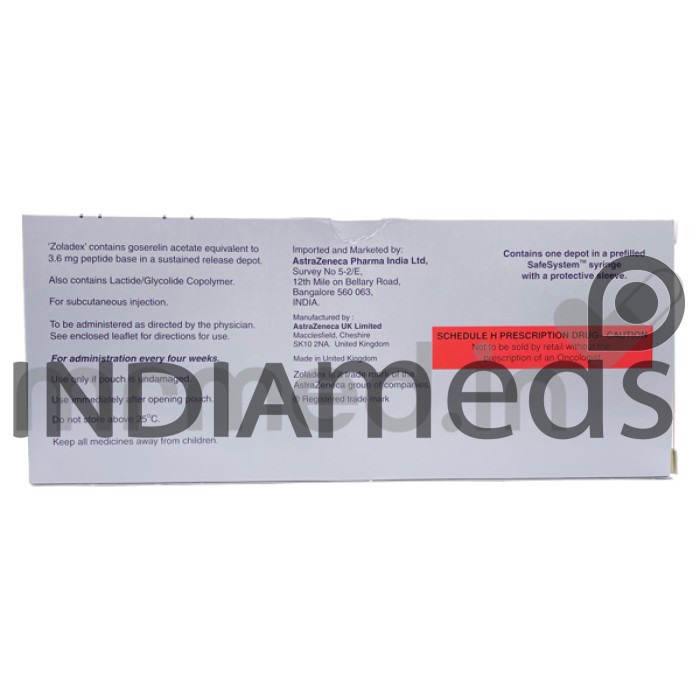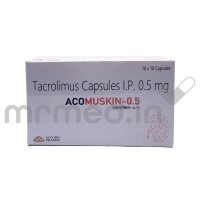Zoladex 3.6 mg injection is a chemotherapy agent containing the active constituent Goserelin Acetate. This medicine belongs to the luteinizing hormone-releasing hormone (LHRH) agonists. In Men, it is used in combination with other medicines to treat localized prostate cancer and used alone to treat advanced prostate cancer. In women, it is used to treat advanced breast cancer, endometriosis, and uterine fibroids. It is also used as an endometrial-thinning agent before surgery on your uterus. It also helps to treat infertility with other medicines. Inform your doctor immediately if you face any injection site injury after receiving the injection.
Zoladex 3.6 mg injection works by reducing testosterone hormone in men and estrogen hormone in women. Do not use this medicine if you are pregnant or breastfeeding. Inform your doctor if you have high blood pressure or heart problems, including rhythm changes. Consult your doctor if you face any mood changes like depression or anxiety when taking this medicine. This medicine is not indicated in children. The most common side effects of Zoladex 3.6 mg injection in men are hot flashes, urinary tract infections, and sexual dysfunction. In women, hot flashes, acne, sweating, and depression are the common adverse effects of this medicine.
Therapeutic Effects of Zoladex 3.6mg Injection
Pregnancy
Zoladex 3.6 mg injection should not be used during pregnancy. It can cause fetal harm. Inform your physician if you are pregnant or planning to get pregnant. It is necessary to consult a physician before starting the treatment.
Breast Feeding
Zoladex 3.6 mg injection should not be used during breastfeeding. It may excrete in breast milk and cause harm to the unborn baby. Inform your physician if you are breastfeeding and get advice.
Lungs
It is unknown whether Zoladex 3.6 mg injection can be used in patients with lung disorders. Consult your doctor if you have any lung diseases before starting the treatment.
Liver
It is safe to administer Zoladex 3.6 mg injection in patients with liver disorders. There is no dose adjustment required. Consult your physician for more advice.
Alcohol
It is not known whether it is safe to consume alcohol with Zoladex 3.6 mg injection. Please consult your doctor.
Driving
Taking Zoladex 3.6 mg injection does not usually affect your ability to drive. Please consult the doctor for more advice.
Common:
- Acne
- Hot flushes and Sweating
- Swelling in the hands and legs
- Headache
- Depression and mood swings
- Erectile dysfunction
- Sexual dysfunction
- Pain, bruising, and bleeding
- Pain while urinating ( in men)
- Dryness or itching of the vagina
- Thinning of bones
Serious:
- Increased blood pressure
- Increased risk of Heart failure
- Increased risk of Diabetes
- Increased risk of stroke
- Injection site injury
- Severe skin reactions
Zoladex 3.6 mg injection will be given to you by your healthcare professional. It is given under the skin (subcutaneously) in your stomach area every 4 weeks. Your doctor will decide the dose and duration of the therapy based on your condition and how well you respond to the treatment.
In women, hot flashes, depression, acne, dryness or itching of the vagina, and excessive sweating are the common side effects of Zoladex 3.6 mg injection.
Mild hair loss is possible with the treatment. If you face more hair fall, consult your doctor for advice.
Yes, Zoladex 3.6 mg injection is used in combination with other drugs to treat infertility in women.
No, Zoladex 3.6 mg injection should not be given to pregnant women. It can cause harm to the unborn baby.
Molecule name: Goserelin Acetate | Therapeutic class: luteinizing hormone-releasing hormone (LHRH) agonists |
Pharmacological class: Anti-Neoplastic drug | Indications: 1. Prostate cancer in men 2. Breast cancer in women 3. Endometriosis 4. Uterine fibroids 5. Female infertility |






